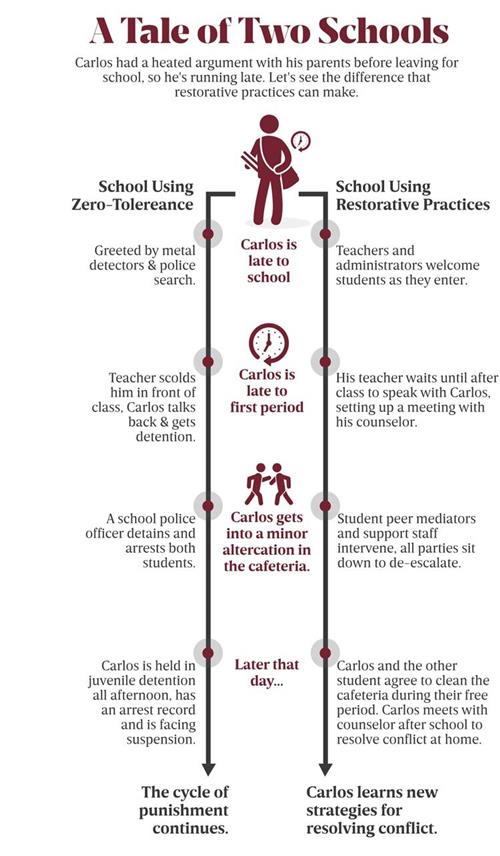Restorative Practices
-
Overview of Restorative Practices in DPS
In Denver Public Schools (DPS), Our mission is to to cultivate a restorative culture in DPS where relationships, accountability, and healing create safe, supportive, and connected school communities. Through the vision of Every Learner Thrives in an Safe & Welcoming inclusive environment where restorative practices foster belonging, equity, and meaningful engagement.
Restorative Practices (RP)—inspired by indigenous values—focus on building community, addressing harm, and supporting students. By fostering safe, trusted relationships, RP creates equitable spaces and a positive school culture. Schools that implement RP proactively plan for and respond to student and community needs in a way that is relational rather than punitive. A strong restorative climate lays the foundation for healthy relationships, meaningful community engagement, and alternative responses to harm, ensuring all students feel a sense of belonging.
Restorative Practices offer effective alternatives to punitive discipline, such as suspensions and expulsions, which disproportionately impact students of color and students receiving special education services. Research shows exclusionary discipline fails to improve behavior or academic success and instead increases disengagement and long-term harm. RP shifts the focus to accountability, relationship-building, and skill development, creating a more supportive and inclusive school environment.
Beyond discipline reform, RP is a framework for strengthening school culture. It fosters respect, accountability, and community engagement, ensuring every student experiences a just, inclusive, and supportive learning environment.
The Role of the DPS Central Office Restorative Practices Team
The DPS Central Office Restorative Practices (RP) team is dedicated to supporting the growth, implementation, and consistency of RP across school teams. Aligned with DPS’s vision that "Every Learner Thrives," our work focuses on Safe & Welcoming Environments, ensuring all students have the opportunity to develop the skills necessary to succeed in a diverse society.
Our Universal school-wide support model provides coaching and consultation on:
- In-person professional learning opportunities for school teams on the What, Why, and How of Restorative Practices (RP) implementation.
- School-wide systems development and implementation of RP.
- Integration of Positive Behavioral Supports to create proactive, inclusive environments.
- Youth leadership in RP through the Peer RJ program such as our Youth Justice Alliances, empowering students to take an active role in restorative processes.
Implementing Restorative Practices (RP) in schools starts with building and nurturing a strong sense of community, which serves as the foundation for effectively addressing harm and conflict. Long-term transformation begins with fostering a restorative culture where relationships, accountability, and healing are prioritized. Once this culture is established, schools can integrate restorative processes to respond to harm in a way that promotes growth and repair. By embedding RP into school culture, we create sustainable, relationship-centered learning environments that support student success and a positive school climate.
A Restorative Response to Harm
Because our current system operates contrary to restorative principles, it is common for implementation of restorative practices to be misunderstood and face resistance; despite this, restorative justice in its basic form is an intuitive concept for most people. In his seminal work, Changing Lenses, Howard Zehr examines the way in which we typically respond to crime and wrongdoing:
Non-Restorative Culture Response:
1. What rule or policy was violated?
2. Who is responsible for the violation?
3. What consequence or punishment will be assigned?
Restorative Culture Response:
1. What harm occurred, and who was impacted?
2. What are the needs of those affected, including the person responsible and the community?
3. What actions can be taken to repair the harm and restore relationships? Who needs to be involved in this process?

Looking Support with Restorative Practices?
Connect with the District RP team to strengthen your school's Restorative Climate and Culture. Let's work together to build a more inclusive and supportive learning environment!
CONTACT
-
Culturally Sustaining Teaching and Learning
1860 Lincoln Street, 8th Floor
780 Grant Street and Acoma Street locationsMarccus Spearman
Manager of Trauma-Informed and Restorative Practices
marccus_spearman@dpsk12.org
QUICK LINKS
-
View our RP 101 Modules Training Information
View our Restorative Practices Guidance for Remote, In-Person, Virtual Learning
View our Restorative Practices and Trauma-Informed Practices Resource List
View our Pre-Conferencing Guideline and Script
View our Restorative Pre-Conference Conversation
View our Reintegration Conferences
View our Restorative Practices/Alternatives to Suspension for Substance Use Infractions












